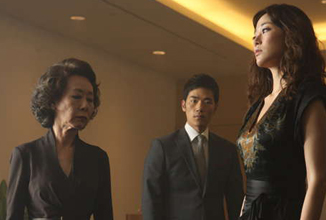 |
Synopsis:
The Taste of Money details the ongoing tale of an insanely rich Korean family - an extension (of sorts) of the story told in The Housemaid (2010) - The Taste of Money’s narrative focusing on company president Yoon (Baek Yoon-sik), his wife Geum-ok (Yoon Yeo-jeong), their daughter Nami (Kim Hyo-jin) and son Chul (On Joo-wan).
While Yoon may be company head in name, the true business and family power are held by Geum-ok and her aged father (Kwon Byung-gil); with Yoon having simply married into the family for money and influence rather than love.
As we join the story, Young-jak (Kim Kang-woo) has been employed as Yoon’s private secretary, initially fully prepared to do whatever is asked of him while at the same time waiting to seize on any opportunity to improve his situation and lot, and he is soon instructed to provide for the needs of a US businessman, Robert Altman (Darcy Paquet), as part of a major business deal that could prove crucial to the family's fortunes.
However, as Robert indulges himself in numerous sexual liaisons with prostitutes, Geum-ok discovers that Yoon has been having an affair with the family’s maid, Eva (Maui Taylor), and decides to force youthful Young-jak into her bed as part of her twisted revenge before embarking on a quest to find a way to make Yoon and Eva pay once and for all.
As the family members increasingly turn on each other, Young-jak, in desperation, seeks help from Nami and the question quickly becomes whether they or anyone will escape unscathed, or in fact at all...
Review:
From the very outset, let me just say that I'm a huge fan of director Im Sang-soo's work and directorial style; a disclaimer of sorts, if you like, even though by stating it I've likely left many of you in little doubt as to where this review is headed. Throughout his career, Im Sang-soo has deftly and expertly created cinematic works with intricately woven narratives; layering each with socio-political commentary and regularly using graphic adult content to critique social norms, attitudes and even society itself. Involved and often deliberately uncomfortable, Im Sang-soo's films can almost always be guaranteed to be every bit as gripping as they are multi-faceted... Almost always...
Im Sang-soo's film prior to The Taste of Money was, of course, his re-imagining of Kim Ki-young's 1960 masterpiece The Housemaid - Im Sang-soo's 2010 version being a sexually charged thriller dissecting the balance (or, more accurately, the imbalance) of power between the "haves and have nots" in Korean society - and with The Taste of Money his intention was to extend these themes yet further by detailing the power struggles within Yoon's wealthy family; once again showing proceedings largely from the perspective of a character who could be described as a somewhat lower class outsider, but this time centring on a combination of the ideas of "money is the root of all evil" and "money can't buy me love".
 |
 |
From the first scene to the very last, The Taste of Money positively screams that it is an Im Sang-soo film - from overall directorial style to camera framing; to narrative arcs; to sets; to character situations and involved dialogue; to even the musical score - to such an extent that even audience members who have seen only The Housemaid (and none of his other previous work) will easily recognise the director's hand at work. However, the fact that The Taste of Money was envisioned as an extension of the themes detailed in The Housemaid causes, almost by its very nature, one of the biggest problems with the film:
It looks like The Housemaid, it feels like The Housemaid (in one scene, characters even watch The Housemaid, 2010, in a private cinema; in another, a character is beaten up/tortured with Kim Ki-young's 1960 film playing on a screen behind them) and its ultimate destination is even deeply reminiscent of... you guessed it... The Housemaid; to the point of the throwing of a (rather contrived) surreal moment into the final scene, much like... I just can't bring myself to say it again, but you know the film I mean.
However, while the above is (mostly) warranted in any continuation of previously dissected ideas, The Taste of Money doesn't have anywhere close to a gripping enough narrative for its intention to be successfully achieved and, sadly, what we're left with is a film that feels like little more than a lacklustre remake of a far superior work; albeit with an older cast and somewhat altered narrative.
For me personally, any cinematic work is only ever as worthy as the viewer empathy it elicits and Im Sang-soo's decision to focus The Taste of Money on characters for whom, over time, a love of money (and the resultant power it allows them) has replaced virtually any and every heartfelt emotion simply makes that empathy even harder to come by, regardless of how interesting the narrative may appear as a concept.
 |
 |
Even the characters of Yoon and Young-jak, whose journeys and plights we are invited and called upon to invest in for a large portion of the running time fail to stir the heart to any degree: Yoon, who decides that love is more important than cash, being rather too accepting of what befalls him and his lover Eva, and essentially giving up without a fight as soon as the hammer begins to fall; and Young-jak appearing as almost as much of an opportunistic voyeur as he does a moral outsider with supposed depth - his battle to remain emotionally connected while the lure of money and power pulls him towards becoming as bereft of feelings as those who surround him ultimately being a fight we watch without ever truly engaging.
As I mentioned earlier (and as many of you will have already have been aware), Im Sang-soo regularly uses sexual content to underline often controversial narrative themes but here The Taste of Money is rather a victim of its own success: With the majority of the (many) sexual liaisons being filmed from a distance, again deliberately adding an air of implied voyeurism to proceedings, The Taste of Money accents and underlines the fact that for most of the characters sex is a meaningless physical pleasure - as much about power as need or intimacy and deemed almost as a right by anyone in their self-involved position - and by doing so resolutely ensures that any possible eroticism is instantly lost. While it's obvious that that was Im Sang-soo's intention, meaningless sex is, well, meaningless and for the most part sadly dull.
That said, there is, however, one sexual encounter in The Taste of Money that deftly serves its purpose; the encounter between two characters of vastly differing ages that is every bit as uncomfortable and difficult to watch as it could, and should, be.
Finally (and I honestly wouldn't blame you for wondering if this review is ever going to end), Im Sang-soo also references matriarchal elements within an overarching patriarchy in the balance of power between the family members but the effect of all the aforementioned issues detracts from even this.
So, what statement does The Taste of Money make at the end of the day? That this is the way of the world for people such as these and those becoming involved must either embrace it or get as far away as possible.
I, for one, chose the latter.
 |
Summary:
Ultimately, while The Taste of Money's narrative is without question an interesting concept in its extension of a previously dissected subject, by the very nature of the characters portrayed it was always going to risk falling flat emotionally. And fall flat The Taste of Money does.
Cast:
The entire cast of The Taste of Money give perfectly acceptable performances throughout but it is Yoon Yeo-jeong's portrayal of the matriarchal Geum-ok that stands head and shoulders (and more) above the rest. Her innate ability to deftly and believably play this type of role makes it easy to see why Im Sang-soo chose to cast her in both The Housemaid and The Taste of Money, in different roles.
Korean film fans should also be aware of the casting of Korean film reviewer and critic Darcy Paquet as the character of American businessman Robert Altman.
Main Cast: Baek Yoon-sik, Yoon Yeo-jeong, Kim Hyo-jin, On Joo-wan
DVD:
The DVD edition reviewed here is the Korean (Region 3) KD Media 2-Disc Limited Edition First Press edition. The film itself is provided as an anamorphic transfer with an aspect ratio of 2.35:1 and there are no image artefacts (and no ghosting) present. The picture is absolutely exemplary and compliments the beautifully rich visuals perfectly.
The original Korean language soundtrack is provided as Dolby Digital 5.1 and is easily equal to the superb image quality present. The musical score is also well balanced and noticeably nuanced throughout.
Excellent subtitles are provided throughout the main feature but English-speaking viewers should note that, as with many Korean DVD releases, there are no subtitles available on any of the extras.
The Taste of Money (DVD) (2-Disc) (First Press Limited Edition) (Korea Version)
Director: Im Sang-soo
Language: Korean
Subtitles: English, Korean
Picture Format: NTSC
Disc Format(s): DVD (2-Disc)
Region Code: 3
Rating: III
Publisher: KD Media
DVD Extras:
- ‘Desire’ Featurette (25 mins)
- ‘Temptation, Lust and Shame’ Featurette (10 mins)
- ‘Riches’ - Production Notes Featurette (5 mins)
- ‘Taboo’ Featurette (5 mins)
- ‘Revelations’ Featurette (6 mins)
- Trailer
|
All images © KD Media
Review © Paul Quinn
|
| |
|








